Investor support for longtime Toyota Motor leader Akio Toyoda fell to its lowest level since he took the helm as shareholders questioned the extent of his control over the company.
According to a filing released on Wednesday, 71.9 percent of shareholders supported Mr. Toyoda’s reappointment as Toyota’s chairman. That met the threshold needed for his re-election but was the lowest level of support for him since at least 2010, after Mr. Toyoda’s first full year as chief executive.
“In the context of corporate Japan, it’s an amazing number,” Hirotaka Uchida, a partner at the consulting firm Arthur D. Little, said of the result of the vote to re-elect Mr. Toyoda. Shareholders want to see changes in Toyota’s governance and the level of influence Mr. Toyoda has at the company, he said: “That has become quite evident.”
Traditionally in Japan, board members receive near-unanimous support from shareholders, and Mr. Toyoda, whose grandfather founded the company, has averaged more than 96 percent approval over the past decade. But that national trend has begun to change in recent years, with more investors using their vote to pressure companies to strengthen profitability and corporate governance.
Ahead of Toyota’s shareholder meeting on Tuesday, the New York Times reported that several large investors planned to vote against Mr. Toyoda’s reappointment. They wondered whether the recent problems with mishandling of vehicle tests might indicate broader governance issues within Toyota, including insufficient checks and balances in management.
“Toyota’s shareholders have now sent a strong message that better governance is needed at the top of the company,” said Anders Schelde, chief investment officer at AkademikerPension, a Danish fund. “We share the concerns expressed and expect the chairman to consider the best interests of the company when deciding his next move.”
Mr. Uchida of Arthur D. Little said there was very little chance this year’s lower approval rating would lead to something as big as Mr. Toyoda stepping down. “But it might mean he’s taking a step back, at least from public view,” he said.
During Toyota’s annual meeting at its headquarters in Toyota City, southwest of Tokyo, Mr. Toyoda defended his active role in the company. He said he would take responsibility for addressing the problems within Toyota that led to the violation of vehicle certification tests.
Mr. Toyoda’s comments reflected his enduring view of himself as a leader who, after guiding Toyota through many challenges during his nearly 14-year tenure at the top, continues to serve as a “rear guard,” protecting company from setbacks so others can maintain forward momentum.
According to data released on Wednesday, 95.4 percent of shareholders voted in favor of Koji Sato, who took over from Mr. Toyoda as chief executive last year. This was slightly lower than last year’s figure of 96.8%.
Toyota said in a statement that it is strengthening its governance practices and has clarified the roles and expectations of its executives and redefined how it assesses the independence of directors.
“We see the approval ratings at this year’s shareholder meeting as honest feedback from institutional investors,” Toyota said. “Moving forward, we will continue to value dialogue with our shareholders, sincerely considering and addressing their feedback.”




